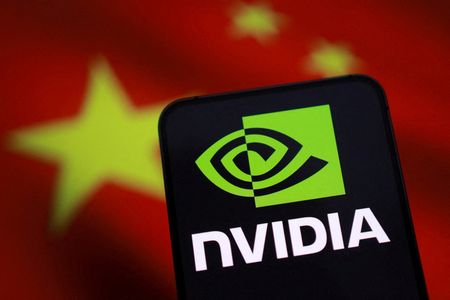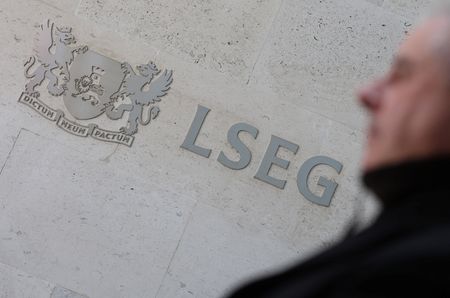By Liam Mo and Brenda Goh
BEIJING/SHANGHAI (Reuters) -Nvidia’s RTX6000D, its newest artificial intelligence chip tailored for the Chinese market, has seen only lukewarm demand with some major tech firms opting not to place orders, two people with knowledge of procurement discussions said.
The RTX6000D, designed mainly for AI inference tasks, is seen as expensive for what it does, the two people said.
They added that testing of samples showed its performance lags the RTX5090 – a chip banned by the U.S. for use in China but which is still readily available through grey market channels at less than half the RTX6000D’s price of around 50,000 yuan ($7,000).
Chinese tech giants, including Alibaba, Tencent and ByteDance, are also waiting for clarity on whether orders for Nvidia’s H20 chip will be processed, separate sources said earlier this month. The U.S. firm regained permission to sell the H20 in July but shipments have yet to restart.
Additionally, the firms are hoping that Nvidia’s B30A – a much more powerful chip than the H20 – will be approved by Washington.
The three chips are downgraded versions of models sold outside China, developed to comply with export restrictions put in place by the United States, which wants to rein in Chinese tech progress and retain its lead in AI development.
Tepid demand for the RTX6000D contrasts with optimistic projections from sell-side analysts. JPMorgan said in a report last month that it expected some 1.5 million RTX6000Ds to be produced in the second half of this year. Morgan Stanley predicted in July that Nvidia would have 2 million RTX6000Ds in its pipeline.
Nvidia began shipping the RTX6000D this week, according to one of the people. The sources were not authorised to speak to media and declined to be identified.
An Nvidia spokesperson said in a statement that the “market is competitive – we offer the best products we can.”
Alibaba did not address a Reuters query seeking comment. Tencent and ByteDance did not respond to requests for comment.
PATIENTLY WAITING
The extent to which China has access to cutting-edge AI chips is one of the biggest flashpoints in U.S.-Sino trade tensions.
On one hand, the U.S. has retreated from its previous position of more severe export restrictions. But Beijing has become increasingly keen for Chinese firms to switch to domestic chips even if Nvidia’s products are preferred by many companies.
On Monday, Beijing accused Nvidia of violating China’s anti-monopoly law, casting more uncertainty on its business in the world’s second-biggest economy.
The move came as delegations from both sides are meeting in Madrid this week to discuss a trade agreement.
Chinese authorities have also summoned companies, including Tencent and ByteDance, over their purchases of the H20, asking them to explain their reasons and expressing concerns over information risks, sources have said.
Nvidia has said its products do not pose any backdoor risks that would give anyone a remote way to access or control them.
The RTX6000D is based on Nvidia’s latest Blackwell architecture with conventional GDDR memory and memory bandwidth of 1,398 gigabytes per second, just below the 1.4 terabyte threshold set under restrictions laid out in April.
It was developed in part to fill a void left by the H20, which was banned from sale in April before that decision was reversed.
The H20, which is priced between $10,000 and $12,000, uses older Hopper architecture but has greater memory bandwidth of 4 terabytes per second.
Shipments of the H20 have, however, not started for several reasons, including Nvidia’s need to sort out some issues related to a recent deal to give the U.S. government a portion of its China sales.
It remains to be seen whether the planned B30A will be approved in Washington. Also based on Blackwell architecture, it is expected to deliver up to six times more performance than the H20 while costing only twice as much, Reuters reported this month.
($1 = 7.1207 yuan)
(Reporting by Liam Mo and Brenda Goh; Editing by Edwina Gibbs)










